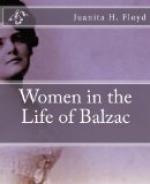Regarding the vital question of his marriage, he writes his sister:
“My greatest wish and hope is still far from its accomplishment. Madame Hanska is indispensable to her children; she is their guide; she disentangles for them the intricacies of the vast and difficult administration of this property. She has given up everything to her daughter. I have known of her intentions ever since I was at St. Petersburg. I am delighted, because the happiness of my life will thus be freed from all self-interest. It makes me all the more earnest to guard what is confided to me. . . . It was necessary for me to come here to make me understand the difficulties of all kinds which stand in the way of the fulfilment of my desires."[*]
[*] The above shows that Balzac’s ardent passion
for his Predilecta
was for herself alone, and
that he was not actuated by his greed
for gold, as has been stated
by various writers.
During this visit, Balzac complained of the cold of Russia in January, but his friends were careful to provide him with suitable wraps. Business matters compelled him to return to Paris in February. In leaving this happy home, he must have felt the contrast in arriving in Paris during the Revolution, and having to be annoyed again with his old debts. This time, he went to his new home in the rue Fortunee, the home that had cost the couple so much money and was to cause him so much worry if not regret.
About the last of September, 1848, Balzac left Paris again for Russia, and his family did not hear from him for more than a month after his arrival. His mother was left with two servants to care for his home in the rue Fortunee, as he expected to return within a few months. It is worthy of note that in this first letter to her, he spoke of being in very good health, for immediately afterwards, he was seized with acute bronchitis, and was ill much of the time during his prolonged stay of eighteen months.
Madame Hanska planned to have him pay the debts on their future home as soon as the harvest was gathered, but concerning the most important question he writes:
“The Countess will make up her mind to nothing until her children are entirely free from anxieties regarding their fortune. Moreover, your brother’s debts, whether his own, or those he has in common with the family, trouble her enormously. Nevertheless, I hope to return toward the end of August; but in no circumstance will I ever again separate myself from the person I love. Like the Spartan, I intend to return with my shield or upon it.”
Things were very discouraging at Wierzchownia; Madame Hanska had failed to receive much money which she was to inherit from an uncle, and, in less than six weeks, four fires had consumed several farm houses and a large quantity of grain on the estate. Although they both were anxious to see the rue Fortunee, their departure was uncertain.




